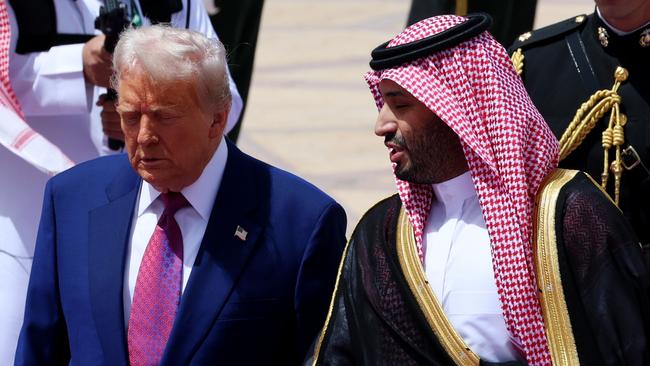
The Albanese government plans not to rush negotiations with Washington over tariffs but will instead watch and wait to see how other deals fall as Donald Trump veers wildly on tariff policy.
Trump’s vaguely worded inaugural trade deal with Britain and his head-snapping reversal on tariffs on China have led senior government figures to believe it’s better for Australia to not be at the front of the queue on tariff negotiations.
Australia is one of more than 50 countries seeking to negotiate lower tariffs with the President after he slapped them with higher tariffs on his so-called “Liberation Day”, before then suspending the rises for 90 days.
Australia faces across-the-board tariffs of 10 per cent in addition to 25 per cent tariffs on steel and aluminium exports to the US, despite being one of the few countries to have a trade surplus with America. Anthony Albanese, who says the tariffs are “not the act of a friend”, is expected to make the case for scrapping all of these new tariffs when he next speaks with the President.
But the dramatic backflip on Trump’s tariffs with China this week is further proof that the President’s tariff policy remains in flux, and at the whim of market forces and the mood of a deeply unpredictable leader.
The risk for Australia is that an early negotiation of lower tariffs could result in a worse outcome than it would later on if Trump continues his recent backtracking from his initial tariff regime.
Trump’s so-called trade deal with the UK last week was not nearly as advantageous to London as British leader Keir Starmer claimed at the time. The UK deal failed to remove the 10 per cent baseline tariffs for British imports although it did remove the tariffs on British steel and aluminium.
Much of the agreement was vaguely worded and amounted to little more than a framework for further negotiations. The kicker was that it allows the US to change course at any time on tariffs – something that cannot be ruled out with Trump as President.
Trump’s spectacular backflip with China, in which tariffs on Chinese imports to the US will fall from 145 per cent to 30 per cent for 90 days – a move roughly reciprocated by China – was driven by economic reality and Trump’s desire to avoid a collapse on Wall Street, a recession or both.
It comes on top of similar earlier announcements and backflips on tariffs including on Canada and Mexico and then on the broadbrush “Liberation Day” tariff announcements.
Trump is vacillating on tariff policy because he is trapped between his conviction that they are good for the US and the weight of evidence from other countries, economists, the Federal Reserve and global markets that they are hugely damaging.
Trump’s tariff regime is also losing support from voters, including many who voted for him last November. A Gallup poll released last week revealed that 89 per cent of Americans believe that tariffs will drive up prices on products. Seventy per cent believe the levies will, in the short term, cost the US more money than they make.
More than 50 countries are lining up to negotiate with Trump over the new tariff regimes he threatens to impose upon them. Many of these countries have had far higher tariffs imposed on them than the 10 per cent general tariff imposed on Australia. These countries will understandably be more anxious to strike a better deal with the US more quickly.
But Trump’s tariff policy is utterly unpredictable right now. It is untethered to logic and entwined with the President’s own emotions. Trump has shown he is willing to reverse it overnight if the markets spook him or if a recession beckons.
In this climate, it makes sense for Australia to go slow and not be first in line to strike a tariff deal with Trump until the dust settles and some form of policy coherence emerges.






